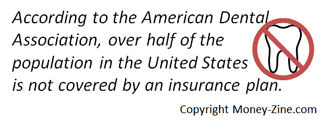Today's dental plans are beginning to look more like health insurance plans of the late 1980's and early 1990's. Companies continue to search for the most efficient ways of supplying medical and dental insurance to employees, which means more dental maintenance organizations (DMO), and paying a greater share of the insurance premiums. In this article, we're going to discuss the basics of dental insurance, how these plans have changed recently, and what to expect from a good dental plan. But first, let's start with a quick discussion of the value of dental health care insurance.
Why Purchase Dental Insurance?
Additional Resources |
Dental insurance works in the same way health insurance does. It protects individuals against the high cost of dental procedures. It is designed to pay for the expenses associated with care administered by a dentist or even a hospital. Many employers offer dental insurance along with healthcare coverage, and that's one of the reasons individuals that participate in health care plans are also receiving dental coverage. This protects employees from unexpected dental costs, and the possibility of incurring a financial hardship.
Benefits of Dental Insurance
According to the American Dental Association, over half of the population in the United States is not covered by an insurance plan. Most of those families that have insurance do so because it's part of the health care benefits provided by their employers. Perhaps the biggest benefit of owning dental insurance is preventative care. Annual or semi-annual check ups can frequently detect damage to teeth long before they require more complex procedures such as root canals and tooth extractions, which often require costly cosmetic repairs such as caps, bridges, or dentures.
Dental Insurance and DMOs
In recent years, companies started to migrate to plans like dental maintenance organizations, or DMOs, because these plans allow them to control the cost of dental services more closely. For example, one dentist might charge a patient $75 for a routine dental cleaning, while another might charge $200. This discrepancy in professional fees is just one of the reasons many companies seek the help of dental networks.

Large companies are often self-insured; they pay to have an insurance company administer their dental plans, but the company itself pays the actual costs of dental services used by their employees. In the example above, perhaps the dentist charging $200 for the cleaning is providing good value, but the company is faced with a decision. Is the dentist charging $75 providing adequate dental services? If the answer to this question is yes, then perhaps a charge of $75 is appropriate for a dental cleaning. Negotiating a fee structure within a network of dentists provides benefits to both the company and the DMO. The company can control costs, and the dentist can get a fair fee in exchange for a large pool of employees seeking their services. In addition, since the company has a greater ability to control costs in a DMO, the benefits included in the plan, or dental coverage, is usually more generous.
Group Plans
Group dental insurance plans are sometimes offered to employees when a company-funded dental plan is not provided. Group plans are usually negotiated with an insurance provider on behalf of employees. Since the transactions involved with managing a larger number of participants is more efficient to administer, the savings can be passed along to employees in the form of lower rates compared to an individual dental plan.
Individual Dental Insurance Plans
If a company does not provide a dental plan, then individual dental plans are offered by a large number of reputable insurance companies. It's possible to find many of these companies simply by searching over the Internet or even by contacting the health insurance company that is already providing a medical plan. Make sure to shop around because identical coverage can vary significantly in cost.
Insurance Limits, Coinsurance, and Deductibles
Even those employees covered under their employer's dental plan may be faced with insurance limits, coinsurance, and deductibles. Dental insurance limits are usually set at the family level or by individual family members. For example, a plan might state the family has an insurance limit of $4,000, or individual limits are set at $1,500. Coinsurance is the term used to describe when payment for dental services is shared between the employee and the employer. Some dental plans might pay 100% of the fees for the first $500 of dental expenses submitted each year, then pay 80% up to a maximum of $1,500 in expenses. This means the employer will pay 80% of the fees from $500 through $1,500, and the employee is responsible for paying the remaining share of these costs. Finally, if a dental plan includes an insurance deductible, then that means the employee is responsible for payment of this fee before the employer begins sharing expenses. Unfortunately, all of these payment-sharing features are really just ways to mask the employee's real out-of-pocket portion of these expenses as companies try to figure out new ways to lower costs.
About the Author - Dental Insurance
.jpg)

